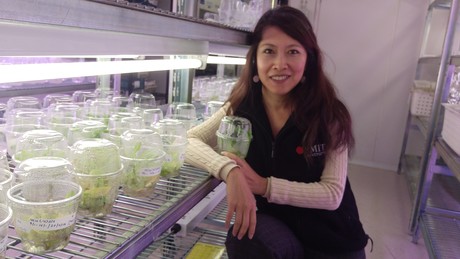From Vietnam War refugee to STEM superstar

She arrived in Australia as an asylum seeker from the Vietnam War, with no English-speaking skills and nothing but the clothes on her back.
Now, more than 20 years later, RMIT University lecturer Dr Tien Huynh has been named as one of the 30 ‘Superstars of STEM’ by Science & Technology Australia. Huynh was selected for her work promoting environmental sustainability, and improving the quality of life and equality for the underprivileged.
The Superstars of STEM program recognises females who are smashing stereotypes and leading the way as role models for young women and girls across science, technology, engineering and mathematics (STEM). The first ever round of superstars was announced by Minister for Industry, Innovation and Science Arthur Sinodinos AO, with the final 30 participants selected from more than 300 applicants. The successful candidates will now receive training and development to use social media, TV, radio and public speaking opportunities to carve out a more diverse face for STEM.
Born in Vietnam, Huynh immigrated to Australia as a six-year old with her mother and sister. Coming from a war-torn country, she has always treasured the value of quality education.
“My parents instilled the importance of education from an early age,” Huynh said. “They believed that education was quintessential for opportunity and freedom, to choose what we wanted to do and follow our passions.”
Huynh found her passion for science at university under the tutelage of an amazing mentor, Professor Ann Lawrie. “She was so generous with her time and knowledge to everyone around her. I have an enormous amount of respect for her passion and contributions in science,” said Hunyh.
From there, she went on to complete her doctorate at the University of Melbourne and postdoctoral research overseas (England and Italy) in evolutionary phylogenetics and conservation biology, before returning to Australia to focus on her postdoctoral research in cancer, tissue repair, neuropharmacology and drug discovery technologies.
Her passion about environmental sustainability, enriched quality lifestyles and equality for the underprivileged is the driving force that has underpinned her research and teaching for over 20 years. Huynh’s current research is focused on plants with high nutritional and medicinal values, including red gac and sabah snake grass — both of which are said to have high anticancer properties.
Huynh, along with Associate Professor Danilla Grando, is co-founder of the Centre for Health and Biological Innovations Lab. Her many achievements include establishing community transformative projects for endangered and medicinal plants, environmental sustainability and agricultural upcycling. She is a regular invited speaker and advisor for government, business and entrepreneurial ventures in ASEAN, with collaborations in Vietnam, Malaysia and Thailand.
Huynh coordinates outreach activities to inspire young minds in STEM, mentors female Asian students and academics to inspire greatness and overcome challenges in their life and careers, and leads overseas work programs that bridge the gap between gender, age and cultural differences.
“It’s an exciting time to be in STEM; there are so many opportunities and possibilities. You only have one life, so dream big, live with passion and make it count,” said Huynh.
Huynh is passionate about inspiring young minds and bridging the gap between research and commercialisation, saying, “There is so much opportunity in the brilliant minds that Australia produces. We invest so much into secondary and tertiary education, we need to capitalise on that and keep the talent in Australia to generate a national income, rather than letting our greatest assets go overseas.”
Huynh said being named a Superstar of STEM was a wonderful opportunity to inspire more young minds and give hope to girls who have nothing.
“My motto is ‘Great achievements can come from humble beginnings’,” Huynh said.
While there are tremendous opportunities, the world of science and research comes with its own set of challenges. “The biggest challenge has been to get recognition for the unseen work that we as academics and scientists do, not just for myself but I’m sure for others also. The many after-hours and weekends sacrificed to mark exams and write manuscripts that are often unrewarded. I am still trying to overcome it, but I think it is a worthwhile challenge because it inspires and transforms so many young lives when it does get recognised,” said Huynh.
“I am most proud when I see my students go on to achieve their own successes and still remember me, knowing that I contributed to their journey.”
Science & Technology Australia President-Elect Professor Emma Johnston said that studies in the USA and other countries similar to Australia had shown female STEM professionals were significantly under-represented.
“Superstars of STEM is the first program of its kind and will prove vital for the future of STEM in Australia,” Professor Johnston said.
“We want Australian girls to realise that there are some amazing, capable and impressive women working as scientists and technologists too, and that they work in and out of the lab in places you might not expect.”
The need for quality assurance in histopathology laboratories
In histopathology laboratories, where tests are considered the gold standard for diagnosing...
Avoid adverse regulatory action with comprehensive quality
Attention to detail is par for the course within most modern industries and fields, including...
The politics of health: how elections will impact on life sciences
With elections this year in the US, the UK and India — all major players in the life...




